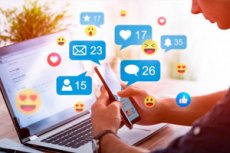
将在 2024 年睡眠年会上公布的一项新研究发现,睡眠时间、社交媒体的使用以及执行控制和奖励处理关键区域的大脑激活之间存在明显的联系。
研究结果显示,青少年睡眠时间较短与社交媒体使用量增加之间存在相关性。分析指出,大脑额叶边缘区域(例如额下回和额中回)参与了这些关系。额下回是控制抑制的关键,可能在青少年如何调节与社交媒体等奖励刺激的互动中发挥关键作用。额中回参与执行功能,对评估和响应奖励至关重要,对于指导平衡社交媒体的即时奖励与睡眠等其他优先事项的决策至关重要。这些结果表明,青少年时期特定大脑区域之间存在复杂的相互作用,以及它们对数字媒体使用背景下的行为和睡眠的影响。
“随着这些年轻的大脑发生重大变化,我们的研究结果表明,睡眠不足和频繁使用社交媒体可能会改变对神经奖励的敏感度,”加州门洛帕克 SRI 国际的认知心理学家兼研究员 Orsolya Kiss 博士说。“这种复杂的相互作用表明,数字使用和睡眠质量都会显著影响大脑活动,对青少年的大脑发育具有明显的影响。”
该研究使用了青少年大脑研究中6516名10至14岁青少年的数据。睡眠时间使用慕尼黑睡眠类型问卷进行评估,社交媒体娱乐使用情况使用青少年屏幕时间调查进行评估。在一项针对与奖励处理相关区域的货币延迟任务中,研究人员使用功能性磁共振成像扫描分析了大脑活动。该研究使用了三组不同的模型,每次的预测因素和结果均有所不同。结果已根据年龄、COVID-19疫情爆发时间和社会人口统计学特征进行了调整。
基斯指出,这些发现为现代青少年生活的两个重要方面——社交媒体的使用和睡眠时间——如何相互作用影响大脑发育提供了新的证据。
了解参与这些互动的特定大脑区域有助于我们识别与数字互动和睡眠习惯相关的潜在风险和益处。这些知识尤为重要,因为它可以指导制定更精准、更循证的干预措施,以促进更健康的习惯。——SRI International 研究科学家 Orsolya Kiss
美国睡眠医学学会建议13至18岁的青少年规律睡眠,每天保证8至10小时。该学会还鼓励青少年在睡前至少30分钟至1小时内远离所有电子设备。
该研究结果发表在《睡眠》杂志上。

